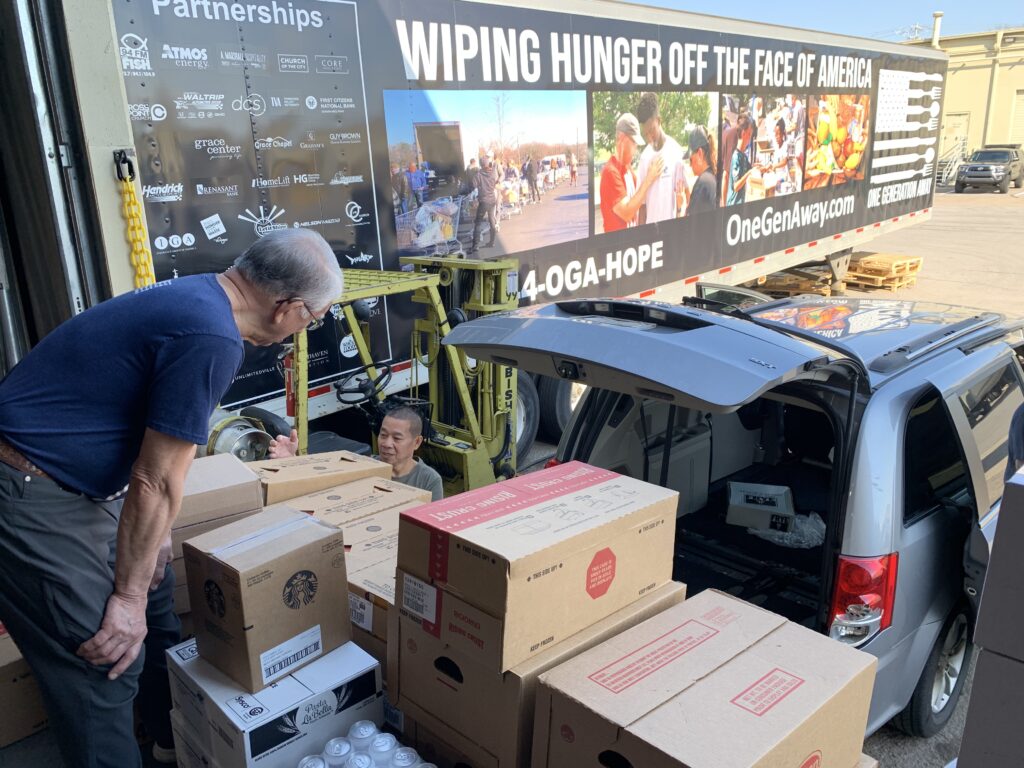
Local non-profit One Generation Away is working hard to get food to people who need it.
The organization operates three warehouses and reaches across Middle Tennessee, Alabama, and the Florida panhandle with 13 staff members and a legion of volunteers.
The organization is hoping to help some of the many people across Middle Tennessee who are experiencing food insecurity. According to a recent Vanderbilt University study, 40% of families with children in the state say they’re unsure of where their next meal will come from.
Chris and Elaine Whitney founded One Gen in 2013 after personally needing help getting food.
“Elaine and I had suffered food insecurity. We had a daughter born with spina bifida in a really rough year work wise, and we were in a food line for six months,” Chris Whitney said.
Once they were back on their feet financially, they wanted to help others in need.
They started with a small SUV and a tip from a friend that a Whole Foods had good food to give away that would otherwise end up in a dumpster.
“We didn’t have a warehouse, so we had to give it away when we picked it up. So we started going into lower income communities and just giving it away,” Whitney said. “And we still do that to this day. Every day we rescue food, it’s on someone’s table that night.”
One Gen is known for having a no-questions asked policy. If you show up at one of their mobile pantries, you can get food.
Supplying community partners
That policy applies to individuals, families and even larger organizations that need the help.
Minister Precious Stone runs Community Homes 33 which both houses and provides resources to unhoused families. Every week, she rents a truck and drives to One Gen’s warehouse to get free food for the families she serves.
On a recent Wednesday, the truck she rented got a flat tire, so she pivoted to a minivan. Not showing up was not an option.
Stone feeds 50 families per home, “then on top of that, I’m feeding the community,” she said. “So I usually do hot meals too along with food boxes. And kids eat a lot of food, especially the boys.”
Six volunteers helped load the van and in about 10 minutes, Minister Stone’s van was filled up with frozen chicken, pasta, canned soup, canned vegetables, snack bars, cereal, boxed water and pizza kits.
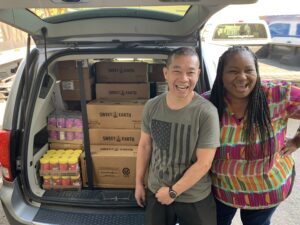
Minister Precious Stone and One Generation Away volunteer Dac made fast work for loading up her van.
Stone said that One Generation Away makes a difference for the families that rely on Community Homes 33.
“So I’m grateful for them. They have really – I don’t want to cry – kept our families fed,” Stone added. “Because a lot of the families that we house are medium income, so they do not get SNAP benefits. And a lot of my single mothers and my single fathers, they have three or more children.”
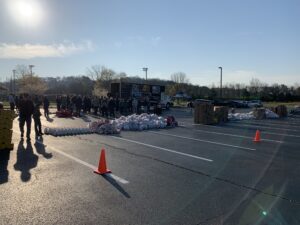
One Gen volunteers gather for an orientation before distributing food for mobile pantry.
Mobile Pantry
One Gen is able to continue its work thanks to volunteers who help at their mobile pantries.
On a windy Saturday morning in Spring Hill, more than 150 cars waited in a community college parking lot.
Annie Stewart and her nine-year old daughter, Georgia, showed up to be a set of helping hands.
“On a Saturday where we can, I try to get her involved,” Stewart said. “Where we can help, we try to help.”
After a short orientation, Annie and Georgia each grab a shopping cart and move through several stations, stopping long enough at each for other volunteers to fill their carts. After the last stop, Stewart’s cart is filled to the brim.
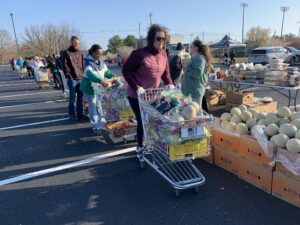
Volunteer Annie Stewart gets a cart filled with groceries on her way to the carline for the mobile pantry.
“So, it looks like we have some prepackaged salads, lots of fruits and vegetables, strawberries and cantaloupe, some bread, onions, pineapple, [and] some cupcakes,” Stewart said, peering into her cart. “These cupcakes are still good, but Walmart couldn’t sell them anymore. So they have found a way to let them not go to waste.”
Following directions, the One Gen volunteers maneuver their heavy carts across the bumpy asphalt to designated spots where they wait for cars. Other volunteers direct a few cars at a time to pull up.
The drivers look exactly like anyone you would see at a grocery store on a Saturday morning.
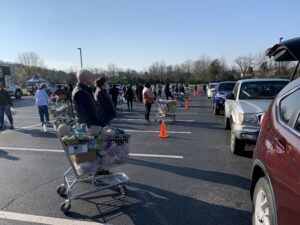
Volunteers wait to put groceries into the cars of those who have come to the mobile pantry.
One of them, Robert, is a retiree who has three family members living with him. A friend told him about the mobile pantry.
“When you’re on a fixed income, it makes a big difference,” he said.
Judy, another person in line, shares the groceries she gets with her daughter and grandkids to help stretch their budgets.
“I’ve been coming for quite a while,” she said.” I came years ago when my husband was suffering from his cancer. Cancer’s expensive, and we really needed the help.”
Judy takes any extra groceries that her family can’t use to neighbors or drops things off at blessing boxes around her county.
José, a dad with a 14 year old daughter and a 13 year old son, is at the mobile pantry for the second time. “Well, it’s tough times. And this really helps for my kids and I,” he said.
Ending stigma
No one gets any questions — only smiles and groceries.
Behind the scenes, Chrisln Ledbetter, a One Gen’s team member, keeps an eye on the whole operation.
Ledbetter studied ministry in college and thought about doing mission work abroad, but she connected to One Gen’s mission.
“Some people get here the night before and sleep in their car because they want to be sure to be the first in line and not get turned away,” she said. “It’s sad to see that level of need, but we’re so happy to meet that need.”
And even though the need is very real, there is still shame around food assistance.
Chris Whitney understands why some may feel that shame.
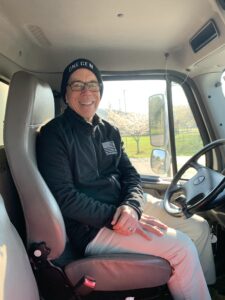
One Generation Away founder Chris Whitney.
“If you can’t provide for your family, something basic as food, then you feel like you’re a failure.” he said. “I feel like it’s an opportunity for people to lose their dignity and their hope.”
Whitney is working to change the narrative around receiving and giving food assistance.
“There’s nothing to be shameful about,” he said. “Life’s full of seasons. It’s a season. Hold your head up [and] just know that there are people out there that aren’t looking down on you. They’re here to walk with you.”
Whitney also hopes that others will follow his example: “When you get to the other side of that season, come back and give back.”

